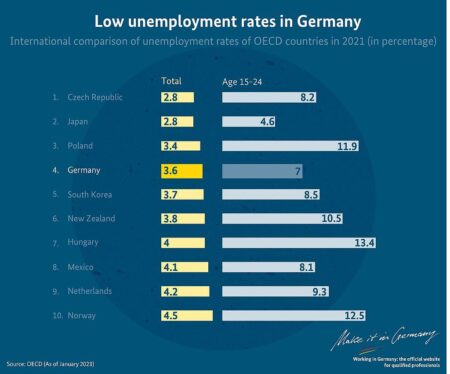The UK jobs market has witnessed its most significant surge in job seekers since 2020, signaling renewed confidence amid economic recovery. Analysts attribute this rise to easing pandemic restrictions and increased hiring across various sectors.
Browsing: labor market
The “China Shock,” a term describing the economic impact of China’s rise on American jobs, reveals critical lessons about globalization and labor. Contrary to President Trump’s interpretation, experts argue that understanding these dynamics is essential for future policy success.
In a notable shift within China’s corporate landscape, some companies are encouraging employees to adopt a reduced work schedule. This move reflects a growing recognition of work-life balance, amidst rising concerns over burnout and workforce retention.
Japan’s real wages fell for the second consecutive month in February, signaling growing financial pressures on households as inflation continues to outpace earnings. This trend raises concerns over consumer spending and overall economic stability.
As Australia approaches the election, the opposition party has abandoned its policy advocating for a return to the office. This strategic shift reflects shifting priorities and the need to resonate with voters increasingly embracing flexible work arrangements.
Germany’s unemployment rate rose to 6.3% in March, marking a notable increase as economic challenges persist. Analysts point to factors such as shifts in the labor market and ongoing economic pressures as contributing elements to this uptick.
Spain is experiencing an economic boom, driven by a resurgence in tourism, robust exports, and increased foreign investment. As the country capitalizes on its diverse sectors, experts predict sustained growth, boosting employment and national confidence.
The unemployment rate in the UK has seen significant fluctuations between 2000 and 2025. According to Statista, the period highlights economic cycles influenced by events such as the 2008 financial crisis and the COVID-19 pandemic, shaping workforce dynamics.
Despite the pressures of Trump’s tariffs, India’s job market is experiencing a significant surge. Companies across sectors are ramping up hiring, driven by a resilient economy and the expansion of tech and service industries, showcasing India’s employment robustness.
China’s rapid advancements in artificial intelligence may offer a silver lining amid ongoing trade tensions and tariff implications. By streamlining production and enhancing efficiency, AI could help businesses offset costs and remain competitive globally.
Germany’s Siemens announced plans to cut over 6,000 jobs worldwide, with approximately half of the reductions taking place in its home market. This organizational shift aims to enhance efficiency and respond to evolving market demands amid economic challenges.
Germany’s auto giant Audi has announced plans to cut 7,500 jobs from its workforce amid ongoing industry challenges. This decision highlights the company’s strategy to adapt to changing market dynamics and a shift towards electric vehicles.
UK wage growth remains stable at 5.9%, according to the latest Financial Times report. This consistent growth could signal resilience in the labor market, despite ongoing economic challenges and inflationary pressures affecting consumers.
The UK economy showed signs of stagnation in January, highlighting the growing challenges for Shadow Chancellor Rachel Reeves. This downturn raises critical questions about the government’s economic strategy and its impact on future growth.
In a significant shift, major Japanese corporations have announced substantial pay and bonus increases for employees, reflecting a growing commitment to improving worker compensation amid rising living costs. This development signals a potential change in Japan’s corporate culture.
Japan’s largest union group is calling for the most significant wage increase since 1993, emphasizing the need to combat rising living costs and enhance worker livelihoods. This demand comes as inflation pressures mount, prompting a potential shift in corporate wage policies.
Lloyds Banking Group has decided to relocate skilled IT roles from the UK to India, according to a report by the Financial Times. This move aims to enhance efficiency and reduce costs, reflecting a broader trend in the banking sector towards offshoring.
Brazil has announced a relaxation of rules governing disbursements from workers’ severance funds, aimed at providing financial relief to employees amid economic challenges. The decision is expected to enhance liquidity for workers facing job loss.
Spain’s economy has transformed from crisis to strength, boasting robust growth and low unemployment. Strategic reforms, strong exports, and a burgeoning tech sector have positioned it as a model for European recovery, drawing admiration and investment.
The recent Trump tariffs aim to protect American industries from foreign competition, advocating for job preservation and economic stability. Proponents argue that these measures create a more equitable trade environment, ultimately benefiting U.S. workers.




















